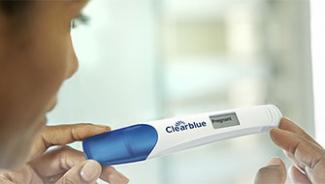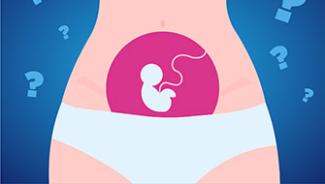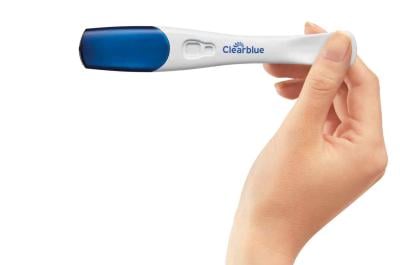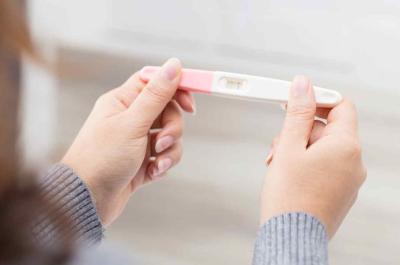You’ve taken a pregnancy test and you see a positive result, but you’re having doubts: Can the test be wrong? Most home pregnancy tests are reliable, for example Clearblue’s tests have an accuracy of over 99% from the day you expect your period, and while it’s possible a test showing a negative result is wrong, particularly if you’re testing early, getting a false positive is extremely rare. Saying that, there are exceptions when your test may come out positive and you are not pregnant, read on to learn about the truth behind false positives.
In this article
- What can cause a false positive?
- What is a chemical pregnancy?
- What is an ectopic pregnancy?
- What is a molar pregnancy?
- Can I get a positive result after a recent pregnancy, miscarriage, or termination?
- Can medications give me a false positive?
- What medical conditions could give me a false positive?
- A pregnancy test works by detecting the hCG hormone, which is usually only present in your body if you’re pregnant.
- A positive pregnancy test result will mean you are almost certainly pregnant.
- Getting a true false positive – when you were never pregnant in the first place – is incredibly rare.
- A test will only show a false positive if you have hCG in your system for another reason such as you were recently pregnant, are taking fertility medications containing hCG, or if you have a medical condition, like some rare ovarian cysts.
- If you are testing before the date of your expected period, you may be pregnant but your hCG levels are too low for the test to detect.
- A test may show positive if you have a chemical pregnancy (early pregnancy loss), an ectopic pregnancy, or a molar pregnancy, but this is not a false positive.
What can cause a false positive?
Getting a true false positive – one where you were never pregnant in the first place – is incredibly rare. Pregnancy tests detect the hCG (human Chorionic Gonadotrophin) hormone in your body, which is only present when you’re pregnant. This is why a positive pregnancy test result will mean you are almost certainly pregnant.
However, in rare instances, you can get a false positive from:
- a recent pregnancy (e.g. after miscarriage, recent birth or termination)
- some rare ovarian cysts
- certain medications containing the hCG hormone, like some fertility treatments
However, there are cases when you may get a positive result and then find out later you are no longer pregnant – but you were. This can happen if you had a chemical pregnancy or early loss, or an ectopic pregnancy. These are not false positives – they are true positive pregnancy results even though the pregnancy doesn’t continue.
What is a chemical pregnancy?
A chemical pregnancy is a very early pregnancy loss that happens just after the embryo implants. An ultrasound wouldn’t detect a fetus, but your body produces the hCG hormone so the result would be positive. Unless you took a pregnancy test, you wouldn’t know you had been pregnant, as a chemical pregnancy will show very few symptoms, and you wouldn’t experience pregnancy-related signs like morning sickness. Many experts think that chemical pregnancies occur for similar reasons as many other miscarriages - due to chromosomal problems with the developing baby.
Watch our video to learn about what is a chemical pregnancy and why it shows up positive on your test. Early pregnancy loss is common – it occurs for around 1 in 4 women – but most women who lose a baby can still go onto have a healthy pregnancy.
What is an ectopic pregnancy?
An ectopic pregnancy is a relatively rare condition (affecting around 1 in 90 pregnancies) where a fertilised egg implants outside the uterus, such as in the fallopian tube. It can be risky to your health if the pregnancy continues and it’s not possible to save the pregnancy. Symptoms of an ectopic pregnancy include:
- a missed period
- pain low down on your tummy to one side
- pain in the tip of your shoulder
- vaginal bleeding or brown, watery discharge
- discomfort on the toilet
These symptoms can be caused by other things such as tummy upset, but if you are pregnant and have any of these symptoms you should seek urgent medical advice as a precaution.
What is a molar pregnancy?
You may test positive if you have a molar pregnancy. A molar pregnancy is a very rare complication that occurs during the very early stages of fertilisation that causes the fetus to develop abnormally. In a full molar pregnancy – when all the genetic material from the mother is lost during fertilisation – there is no baby. Instead, a mole, a cluster of abnormal cells that grow into cysts, form. You can read about a molar pregnancy in more detail here. A molar pregnancy will also show up as a positive result since your body is producing hCG and is not a false positive result.
Can I get a positive result after a recent pregnancy, miscarriage, or termination?
Yes. If you’ve recently been pregnant, whether you’ve just had a baby, a miscarriage, or a termination, it is still possible for hCG to be present in your blood and urine for some time afterward. Your hCG levels will slowly start to fall naturally, but a pregnancy test, may detect residual hCG levels and give a positive result, even though you’re no longer pregnant. If you continue to see a positive result on pregnancy tests and are concerned, see your doctor.
Can medications give me a false positive?
Yes, but only some. Taking antibiotics won’t make your pregnancy test positive, but if you’re on fertility medications, containing hCG (these are given by injection) you may get a false positive result. These drugs include:
- Novarel® (Ferring B.V.)
- Pregnyl® (Merck)
- Ovidrel® (Merck)
- Profasi® is a registered trade mark of Ares Trading S.A
Most medications you have in your medicine cabinet, such as painkillers, antacids, etc. will not affect the result of a home pregnancy test.
What medical conditions could give me a false positive?
In some rare instances, certain medical conditions can cause a rise in hCG levels, even when you’re not pregnant. These include:
- ovarian cysts
- kidney disease
- certain cancers
- disorders that affect hormone levels, particularly in menopausal or peri-menopausal women
- tumors of the cells that would make up the placenta

More trust in early results
Discover Clearblue Digital Ultra Early, our most sensitive digital pregnancy test that gives you digital results 6 days early.
Test sensitivity is 10mIU/ml. 78% of pregnant results can be detected 6 days before your missed period.

Think you might be pregnant?
Discover Clearblue Digital Ultra Early, our most sensitive digital pregnancy test that gives you digital results 6 days early.
Test sensitivity is 10mIU/ml. 78% of pregnant results can be detected 6 days before your missed period.




